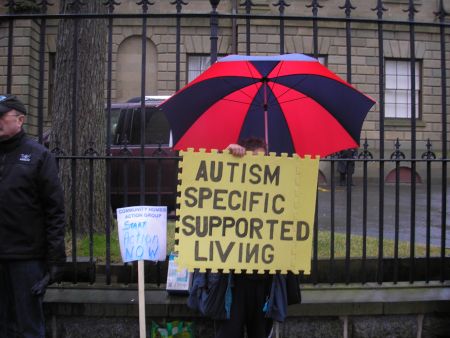About 120 people with mental or physical disabilities and their parents, spouses and caretakers, gathered March 19 at the Nova Scotia Community College campus in Dartmouth to provide feedback on the provincial Putting People First initiative.
Putting People First is a public consultation process on the services people with disabilities receive from the province of Nova Scotia – one more in a long series of consultations, according to participants.
Asked to comment on philosophical underpinnings, principles and vision statements, frustrated attendants countered with questions about concrete measures, dollars and timelines. Participants responded to what they saw as abstract questions by talking about day-to-day poverty and hardship, and expressing frustration with red tape and what they see as inadequate programming.
John Cox, a founding member of the advocacy group People First of Canada and its Nova Scotia chapter, expressed what became a common theme at the meeting.“I have been part of many conversations [with government] for years. You know what we want,” said Cox.
Amy Moonshadow, chair of the Community Advocates Network, a grassroots coalition of advocates for low-income people, echoed these sentiments. “Over the years we have generated enough reports to fill this room,” said Moonshadow.
According to the Nova Scotia government, both the Continuing Care program provided by the Department of Health and Wellness and the Services for Persons with Disabilities program offered by Community Services target the same groups, yet processes and definitions are frequently not aligned. As well, gaps between the two offerings are difficult to identify, because no holistic view exists of the various programs delivered by the two departments.
To begin to address these issues people were asked to validate that the new and improved approach should be person-focused, home and community-based, and should move away from institutions. But speakers instead steered the conversation back to the concrete problems they face each and every day.
When the room was asked what “person-focused” should mean one attendant responded: “These questions are great for a university class. A person-focused approach is simply how people without disabilities live their lives each and every day.”
“[W]e all know what that means,” she continued. “It means adequate transportation, affordable housing and the ability to live in a community. Anything I am eligible for, my daughter should be eligible for,” she said. “We don't care about anything else until we have food, safety, shelter and transportation. Our thing is broken at the very bottom.”
Cox addressed the notions of community and moving away from institutions. “In the last couple of years you put buildings on the grounds of institutions and said this is what community living looks like. That is utter BS,” said Cox. “I personally would like to see a moratorium on new admissions and an announcement before the next election on the closure of institutions.”
In December of last year people rallied at the provincial legislature and in Sydney to draw attention to the lack of suitable housing options for people living with developmental disabilities.
Many of the tens of people who spoke at the meeting described their daily problems and their sense that government isn't listening.
The low quality of in-school programs, and the lack of meaningful follow-up once a student graduates was one recurring theme. Many parents described how their effort to establish suitable community living opportunities for their kids ran into government red tape.
Financial difficulties and outright poverty were frequent complaints as well. For instance, people who are deaf or hard of hearing receive inadequate financial support for often very expensive special needs equipment. Also, many parents give up careers to stay at home and take care of their children.
Supporting more small option homes, a supported living environment for three or fewer residents, was frequently suggested as a concrete measure that would instill confidence that government is truly sensitive to the needs of the disabled and their caregivers.
The Nova Scotia Association for Community Living (NSACL), a prominent advocacy group for the rights of intellectually disabled Nova Scotians, issued a public response to the consultation on March 20. Recognizing the effort as a first step in the right direction, it asks for more clarity on many statements in the discussion paper.
As well, the NSACL response strongly emphasizes the need for measurable results, and indication on how initiatives will be funded.
The consultation, with additional meetings planned for Kentville, Truro and Sydney, will result in what facilitator Mary Jane Hampton referred to as a draft action plan by June of this year. She cautioned the attendants not to expect that much from the recommendations will be reflected in the upcoming budget. “This is a five-year plan, a ten-year plan,” Hampton explained.
Two other consultations that touch upon many of the same issues are also ongoing.
In December of last year Community Services announced that it hired the Institute for Research and Development of Inclusion in Society to help improve the services it provides to people living with disabilities. The recently launched Community Services Housing Strategy aims to address housing issues specific to this very same group.
How the three consultations align was not addressed at the meeting.



